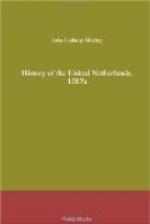“You are to consider that we are not come into these countries for their defence only, but for the defence of her Majesty and our own native country, knowing that the preservation of both dependeth altogether upon the preserving of these. Wherefore I do eftsoons intreat and require you to forbear to intermeddle any further. If there shall follow any dangerous effect of your proceedings, after this my friendly advice, I shall be heartily sorry for your sake, but I shall be able to testify to her Majesty that I have done my duty in admonishing you.”
Thus spake the stiff councillor, earnestly and well, in behalf of England’s honour and the good name of England’s Queen.
But the brave soldier, whose feet were fast sliding into the paths of destruction, replied, in a tone of indignant innocence, more likely to aggravate than to allay suspicion. “Finding,” said Stanley, “that you already threaten, I have gone so far as to scan the terms of my commission, which I doubt not to execute, according to his Excellency’s meaning and mine honour. First, I assure you that I have maintained justice, and that severely; else hardly would the soldiers have been contented with bread and bare cheese.”
He acknowledged possessing himself of the keys of the town, but defended it on the ground of necessity; and of the character of the people, “who thrust out the Spaniards and Almaynes, and afterwards never would obey the Prince and States.” “I would be,” he said, “the sorriest man that lives, if by my negligence the place should be lost. Therefore I thought good to seize the great tower and ports. If I meant evil, I needed no keys, for here is force enough.”
With much effrontery, he then affected to rely for evidence of his courteous and equitable conduct towards the citizens, upon the very magistrates who had been petitioning the States-General, the state-council, and the English Queen, against his violence:
“For my courtesy and humanity,” he said, “I refer me unto the magistrates themselves. But I think they sent rhetoricians, who could, allege of little grief, and speak pitiful, and truly I find your ears have been as pitiful in so timorously condemning me. I assure you that her Majesty hath not a better servant than I nor a more faithful in these parts. This I will prove with my flesh and blood. Although I know there be divers flying reports spread by my enemies, which are come to my ears, I doubt not my virtue and truth will prove them calumniators and men of little. So, good Mr. Wilkes, I pray you, consider gravely, give ear discreetly, and advertise into England soundly. For me, I have been and am your friend, and glad to hear any admonition from one so wise as yourself.”




